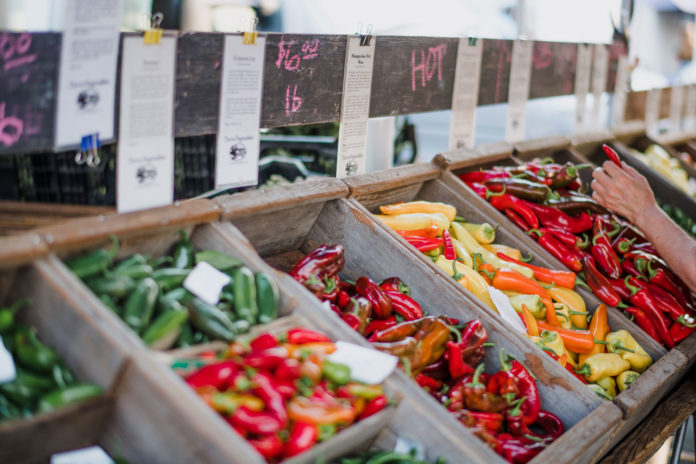On Thursday, January 12th Western Growers’ Kara Timmins had a piece in the organization’s newsletter about a part of agriculture not usually discussed in the fields; grocery stores – the final connection to the consumer. Timmins wrote about a proposed merger between Kroger and Albertsons grocery chains.
How big a deal is this? According to Wall Street Zen 78.04 percent of Kroger is owned by institutional shareholders, 1.7 percent by Kroger Company insiders and 20.26 retail investors. W. Rodney McMullen owns 3.42 million shares or about .48 percent of the company making him the largest individual shareholder. The current value of McMullen’s stock is more than $156 million. The largest institutional investors are Vanguard Group Inc., Blackrock Inc. and Berkshire Hathaway Inc. with a combined 27.55 percent ownerships of the company. CAL Pers, the California Public Employees Retirement System owns .64 percent, or 4.6 million shares valued at $210 million. Wall Street Zen states the Vanguard Group and Blackrock also own shares in Albertsons.
Below is a copy of the letter from Western Growers, California Fresh Fruit Association and the Colorado Fruit & Vegetables Association to Lina Khan, Chair of the Federal Trade Commission. Spoiler alert, the growers associations are not in favor.
December 27, 2022
The Honorable Lina Khan
Chair
Federal Trade Commission
600 Pennsylvania Avenue, NW
Washington, DC 20580
Dear Chair Khan:
On behalf of the collective members of Western Growers, California Fresh Fruit Association and Colorado Fruit & Vegetable Growers Association, we are writing to express our opposition to Kroger Company’s (Kroger) proposed $24.6 billion acquisition of Albertsons Companies, Inc. (Albertsons).
Family farmers like those represented by our organizations have good reason to be concerned that this deal is detrimental for suppliers of fresh produce. The two retail giants combined would account for 15.6% of the U.S. grocery market share, second only to Walmart at 21%. But if this deal is granted approval by the FTC, suppliers of fresh produce will be harmed by shrinking competition among retailer buyers since the newly combined entity would have significantly more leverage over the growers and shippers that feed the nation. This will not only reduce farmers’ margins and pressure them to cut back on acreage, but also have negative impact on farmworker jobs and income. Consumers who purchase our members’ products will see prices in the produce aisles of grocery stores rise, making it more difficult for Americans to eat healthy fruits, vegetables, and tree nuts.
Supermarket Consolidation Hurts Farmers and Produce Shippers
Kroger and Albertsons – currently the largest and second-largest supermarket chains in the United States – already exert considerable market buying influence as standalone entities over produce suppliers. Their merger would exacerbate the cycle of supermarket consolidation we have seen in recent years. For example, when Albertsons acquired Safeway in 2015, Albertsons consolidated its buying program by rewarding contracts only to its largest produce suppliers. Those who shipped fewer packages to Albertsons and had low to no exposure to Safeway pre-merger were supplanted in favor of Albertsons’ largest shippers.
The buying power of the newly combined Kroger entity cannot be understated. Growers and shippers are ultimately price takers and are constantly struggling to achieve better than breakeven pricing from retailers. An entity as large as Kroger-Albertsons combined will allow it to dictate pricing and leverage its buying power with even more aggressive contract pricing than is currently seen. This exorbitant buying power will allow Kroger to play suppliers against one another to compete for the business.
Another consequence of consolidation has been the increased sourcing by retailers from foreign suppliers who are ready, willing and able to undercut American producers on operating costs and price they will accept from the retailer. With the volume of product Kroger will be able to move post-merger, contract prices offered to suppliers will fall fast, while the cost burden to our industry for labor, water, fertilizer, transportation, and other expenses goes up year after year. Meanwhile, foreign suppliers will reap the rewards of expanded shelf space.
Kroger’s Undue Influence Over Produce Sellers
In 2018, Kroger sent a letter to shippers announcing new standardized payment terms of “Net 90 days.”1 Such payment terms would force shippers to waive Perishable Agricultural Commodities Act (PACA) Trust protections, which ensure farmers receive prompt payment for the fresh product they sell to retailers. Kroger understood that agreeing to any extension beyond the PACA-required 30 days permanently waives a produce seller’s trust protections. The move sparked outrage by the industry, driving a Western Growers-led coalition to push back against Kroger’s overreach. The behemoth retailer, under considerable pressure from both industry and the U.S. Department of Agriculture, rescinded its egregious payment policy less than a month later.
While Kroger withdrew its attempt to unilaterally impose PACA waiver payment terms on shippers, Kroger continues to exert outsized influence over its produce suppliers. For example, Kroger offers shippers an egregious take-it-or-leave-it contract pricing structure. Few shippers have the leverage to negotiate more balanced terms. And shippers, including those with long-term relationships with Kroger, find that it is very difficult to regain the business with Kroger should they ever deign to decline Kroger’s intolerable terms. But as the nation’s largest supermarket chain, many suppliers have little choice but to accept the razor-thin margins Kroger is willing to pay.
Moreover, Kroger bills shippers for the design of Kroger private label packaging. The massive retailer also does not permit suppliers to dispute quality rejections or quantity discrepancies – practices that fall well outside of industry norms. As a result of these heavy-handed practices, many of our members opt to sell their produce to Albertsons or other retailers, rather than Kroger, if they can. If Kroger is permitted to acquire Albertsons, that will eliminate yet another major produce buyer and competitor to Kroger, allowing Kroger to push prices down even further on its suppliers.
Kroger’s divestiture plan will not lessen these impacts. As you know, the FTC required Albertsons and Safeway Inc. to divest 168 stores as part of a settlement allowing those companies to merge. Albertsons bought 33 stores back less than a year after the deal closed when Haggen Holdings LLC—which had bought most of the available Albertsons stores—filed for bankruptcy. You criticized that outcome in 2017, calling it a “spectacular” failure that a casual observer could have anticipated. If the Kroger divestiture plan is permitted to proceed, past will be prologue.
Conclusion
The acquisition by Kroger of its largest supermarket competitor will result in undesirable, yet entirely foreseeable, consequences. In response to consolidation of the retail grocery segment, produce shippers have been pressured to consolidate themselves to remain competitive as suppliers for the few remaining major retail grocery outlets. Particularly in the leafy green vegetable sector, many growers are left with one or two shippers they can grow for.
Middlemen-processors and shippers are similarly squeezed on price by giant retailers like Kroger, so they in turn are forced to push down the price they will pay to the growers for the product that they process and ship to stores.
Eliminating major competitors from the marketplace never leads to reduced prices for the consumer. Rather, food costs – already under pressure by high inflation – will only go up if this mega-merger is permitted to proceed. That is harmful for consumers.
Growers are being paid less for the crops they grow, while the cost of labor, water, fertilizer and crop protection tools, transportation costs, and regulatory compliance continue to rise – something must give. This dual pressure has forced many of our members to farm less acreage, move production to other countries when feasible, or leave farming altogether. That is harmful for farmers, farmworkers and rural communities that depend on a robust agriculture industry.
A loss of farmers will lead to far less domestic production of fresh fruits, vegetables, and tree nuts, accelerating the already-historic rate at which the United States imports its food supply. If this continues, the U.S. will no longer have food security, which is tantamount to national security. That is harmful for the entire nation.
In sum, the Kroger-Albertsons merger is anticompetitive and will harm the fresh produce industry, farmworkers and farm communities, consumers, and threaten national security. We urge FTC to oppose this merger.
Thank you for your attention to this matter.
Sincerely,
Dave Puglia
President and CEO
Western Growers
Ian LeMay
President
California Fresh Fruit Association
Bruce Talbott
President
Colorado Fruit & Vegetable Growers Association
cc: Jonathan Kanter, Assistant Attorney General – Antitrust Division, Department of Justice
DISCLAIMER OF RESPONSIBILITY; Waterwrights.net strives to provide its clients with the most complete, up-to-date, and accurate information available. Nevertheless, Waterwrights.net does not serve as a guarantor of the accuracy or completeness of the information provided, and specifically disclaims any and all responsibility for information that is not accurate, up-to-date, or complete. Waterwrights.net’s clients therefore rely on the accuracy, completeness and timeliness of information from Waterwrights.net entirely at their own risk. The opinions expressed in this report are those of the author and do not represent any advertisers or third parties.
ALL RIGHTS RESERVED. Copyright 2023 by WaterWrights.net































